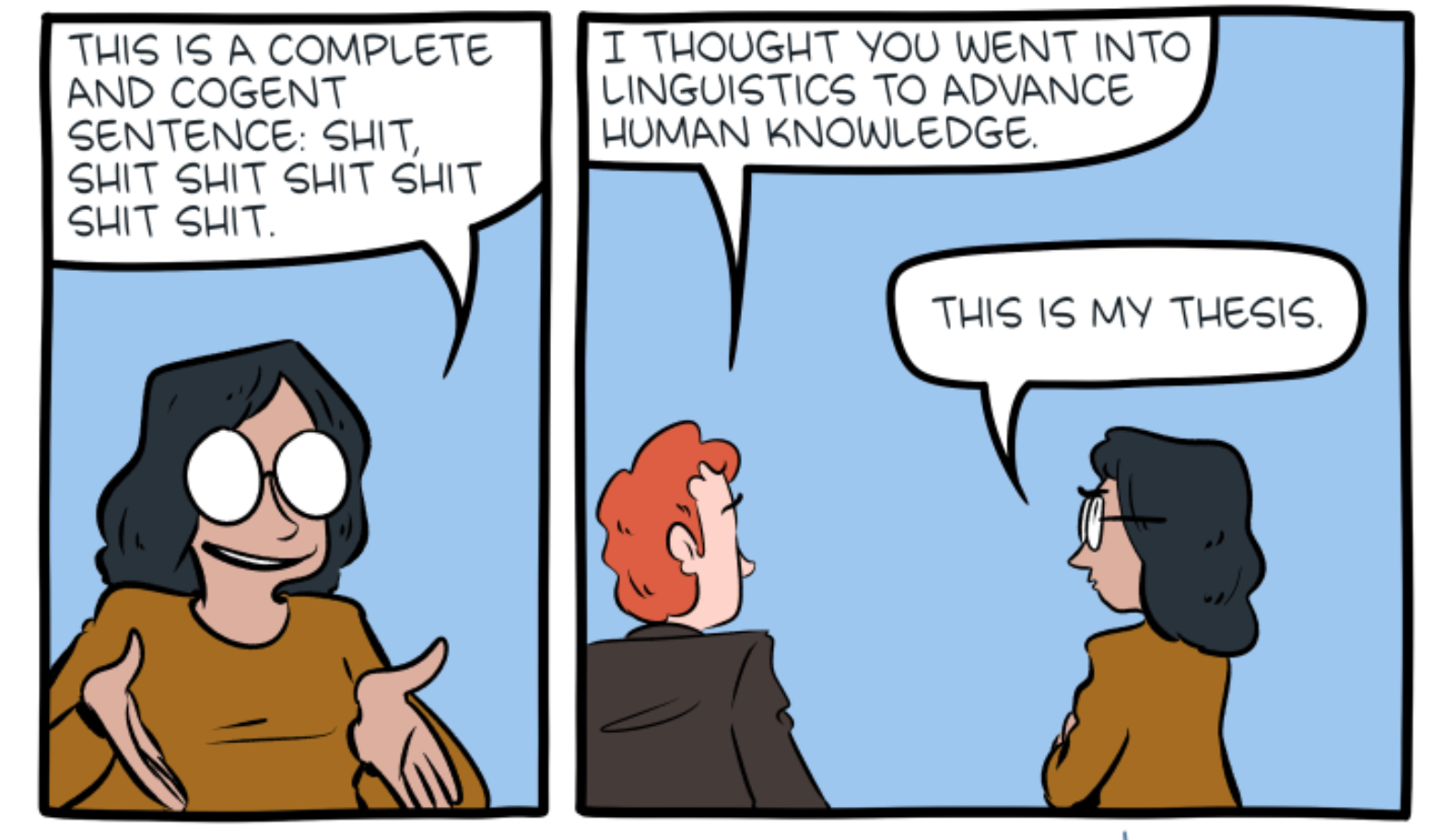A Sino-Italian mistranslation morass
A jumble of soccer talk and Confucian piety, with a splash of CCP ideology
Week in China has an interesting article about a football flap that occurred recently in China:
"Lost in translation: Cannavaro gets Confucian" (May 14, 2021; WiC 540)
The story is quite convoluted and complicated, so we need to start with the background of the key term at play: shì 士 (not tǔ 土 ["earth; soil; dust; local; native; indigenous; uncouth; colloquial"] — it is very easy to confuse the two characters). You will note that nowhere in this long article is there any attempt to translate 士 ("warrior; soldier; scholar; gentleman") into English, and that is a big part of the rub.
Read the rest of this entry »
Buffalo shit
The last two panels of today's SMBC:
For background, see "Buffaloing buffalo", 1/20/2005.
Read the rest of this entry »
Difficult tongues
Johnson, in the Economist (5/7/21), has an enjoyable article: "Some languages are harder to learn than others — but not for the obvious reasons".
Here's the first part of the article:
When considering which foreign languages to study, some people shy away from those that use a different alphabet. Those random-looking squiggles seem to symbolise the impenetrability of the language, the difficulty of the task ahead.
So it can be surprising to hear devotees of Russian say the alphabet is the easiest part of the job. The Cyrillic script, like the Roman one, has its origins in the Greek alphabet. As a result, some letters look the same and are used near identically. Others look the same but have different pronunciations, like the p in Cyrillic, which stands for an r-sound. For Russian, that cuts the task down to only about 20 entirely new characters. These can comfortably be learned in a week, and soon mastered to the point that they present little trouble. An alphabet, in other words, is just an alphabet. A few tricks aside (such as the occasional omission of vowels), other versions do what the Roman one does: represent sounds.
Read the rest of this entry »
Charaelerislie
Francois Lang sent in this menu from YU Noodles Cafe in Rockville, MD:
Read the rest of this entry »
Slaves and clients; Arabic Mamluks and mawlas: a fishy Turkic tail
From my 10th grade high school world history class in 1959, I was intrigued by the evocative, mysterious Mamluks. I was impressed by their achievements in statecraft, art, architecture, and many other fields. Thus Mamluk is a word that is very well known in English, even to a rural highschooler in Osnaburg Township of Stark County in northeastern Ohio, but I never imagined that their name meant "slave". Rather, I thought of the mighty Mamluks as military forces who were like knights, and in some cases were even rulers who founded states of their own. That they were, but I didn't realize they were of slave origin.
Mamluk (Arabic: مملوك mamlūk (singular), مماليك mamālīk (plural), translated literally as "thing possessed", meaning "slave", also transliterated as Mameluke, mamluq, mamluke, mameluk, mameluke, mamaluke, or marmeluke) is a term most commonly referring to non-Arab, ethnically diverse (mostly Turkic, Caucasian, Eastern and Southeastern European) slave-soldiers and freed slaves to which were assigned military and administrative duties, serving the ruling Arab dynasties in the Muslim world.
Read the rest of this entry »
IHTFP
Today the MIT Sloan Executive Education program sent me an email with the subject line "The Spirit of Hacking at MIT":
While the terms hack and hacker have many shades of meaning, the hacker ethic has always been celebrated at MIT. Referring to a difficult, complex, and creative campus prank, hacking at MIT is everything from transforming MIT's Green Building into a giant game of Tetris to the most recent redecoration of the Great Dome as Captain America's shield.
To us, hacking means more than just practical jokes. It represents a culture of free information, hands-on experimentation, and disregard for (or redefinition of) bureaucracy. At MIT Sloan Executive Education, we recognize that the spirit of (ethical) hacking is the same fearless spirit that drives invention, innovation, and entrepreneurship.
At MIT Sloan, we applaud the “hackers” among you who are making waves. We encourage you to channel that spirit and hone those skills in Executive Education courses designed to help you revolutionize your business strategy, find creative solutions to systemic problems, and generate breakthrough business ideas.
The link goes to a page on the IHTFP Hack Gallery site listing "Hacks by Year" — other pages include "Best of the Gallery", "Hacks on Harvard", and "Frequently Asked Questions", where you'll learn that IHTFP doesn't really stand for "Interesting Hacks To Fascinate People".

Read the rest of this entry »
Intonation in "human emulation mode"
Dave Itzkoff, "Elon Musk Hosts a Mother’s Day Episode of ‘Saturday Night Live’", NYT 5/9/2012 ("The much-discussed Tesla and SpaceX executive took a self-deprecating approach, telling viewers, 'I’m pretty good at running human in emulation mode.'"):
Musk, the billionaire chief executive of Tesla and founder of SpaceX, appeared in several “S.N.L.” sketches this weekend, playing characters that included a doctor at a hospital that caters to Generation Z patients, the producer of an Icelandic TV talk show and the video game villain Wario.
He used his opening monologue to share some personal details about himself, introducing viewers to his mother and discussing his diagnosis of Asperger’s syndrome — […]
Musk took a self-deprecating tone in his “S.N.L.” monologue, telling the audience: “Sometimes, after I say something, I have to say, ‘I mean that,’ so people really know that I mean it. That’s because I don’t always have a lot of intonational variation in how I speak. Which I’m told makes for great comedy.”
The question of intonational variation in the speech of people on the autism spectrum is an interesting one. In the literature and in clinical presentations, I've seen phrases like "As is well known, autistic individuals have monotone intonation", and also "As is well known, autistic individuals have singsong intonation".
This apparently reflects the fact that most observers of intonation only notice differences between what they expect and how people talk. So depending on their relationship to the speakers and the contents and contexts of interaction, they might perceive the same speakers' intonation as inappropriately monotone or inappropriately varied. There may also be relevant subgroups within the large and extremely varied space of people "on the spectrum" — autism is one of the many DSM-defined behavioral categories that are "phenotypically diverse", which a clinician friend explains is the Greek translation of "We have no f-ing clue"…
Read the rest of this entry »
When intonation overrides tone, part 6
Subtitle: Virtuous / disgusting behavior / character
There's a common Mandarin put down that is much favored by Peking shopgirls:
Qiáo nǐ nà dé xìng ("Just look at that virtuous / disgusting behavior of yours!")
Readers will notice that I did not provide characters, since in truth there is a real problem knowing which character to choose for the last syllable. There's no question whatsoever that it is pronounced in an emphatic fourth tone, which would make one think that it should be written as 性 ("nature; character"). The problem is that underlying the unmistakable fourth tone is an actual second tone, which should in fact be written as 行 ("conduct; behavior").
What's going on here?
Read the rest of this entry »
Wanna, gotta
From Doonesbury 5/2/2021:
Linguists have paid a lot of attention over the years to wanna-contraction, starting with George Lakoff's 1970 paper "Global rules" — see these lecture notes for a discussion, if you're interested. But gotta-contraction has gotten a lot less attention — 7 Google scholar hits vs. 658.
The reason for this difference is simple: "want to" is occurs in different structures that have different contraction frequencies, thus entangling syntax, morphology and phonology in a pattern that people have been trying since 1970 to figure out how to untangle. "Got to" seems to occur in the same structures, but these turn out to involve quite different senses of get, which maybe even should be considered different words.
Read the rest of this entry »
Headline writers, crash blossom victims need your help
A headline from today's BBC News: "Knife crime: St John Ambulance to teach teens to help stab victims."
Read the rest of this entry »
How to “get the fuck out” in Japanese
[This is a guest post by Nathan Hopson]
The issue of profane language in Japanese has been discussed on LL at some length and with sundry examples, at least one of which I provided myself (shitshow).
Nevertheless, while recognizing the risk of flogging a dead or moribund steed, I was sufficiently taken aback by a headline in today’s news to feel it warranted a bit of exposition.
The headline, which, notably, came from Japan’s hard-right, anti-China Sankei newspaper, was:
「中国よ、消えうせやがれ」 フィリピン外相、“禁句”使って怒り爆発
“Chūgoku yo, kieuseyagare” Firipin gaishō “kinku” tsukatte ikari bakuhatsu
“Hey China, fuck off!” Philippines foreign minister uses taboo word in angry explosion
Read the rest of this entry »
Childrens parent-child room
This post is a follow-up to "Nordic amorous room" (5/5/21). In the comments to that post, cliff arroyo remarked:
I feel like a dope for being the one who has to ask, but….
"Childrens parent-child room"
What?
He was referring to another part of the sign on which "Nordic amorous room" appears, which you can see by clicking on the title above. I replied to him:
I was hoping that no one would ask the question that cliff arroyo did, because it's nettlesome, but since he did, I started working on a reply to it early this morning. Now that John Swindle has given us one idea of how to explain the conundrum, I feel all the more compelled to do so. Will post by this evening — within about nine hours.
Read the rest of this entry »




